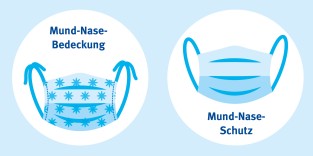Facts on wearing masks
10.11.2020

The DGUV currently has no evidence of health hazards resulting from wearing masks. (Photo: DGUV )
The German social accident insurance institutions for the public and private sectors have been receiving more and more enquiries about the use of masks. Many of these enquires are related to the concern that wearing masks can be dangerous to a person’s health. The German Social Accident Insurance (DGUV), the umbrella association of the German social accident insurance institutions for the public and private sectors, explains:
"The German social accident insurance institutions for the public and private sectors currently have no evidence to prove that wearing a fabric mask impairs breathing to a degree that is hazardous to health or could trigger “CO2 poisoning". Conversely, the social accident insurance institutions see masks as a way to reduce the risk of droplet infections with the coronavirus Sars-CoV-2 when minimum distancing is not guaranteed.
If employers make it compulsory to wear a mask, they are obliged to take this into account in their risk assessment. In recent months, this has repeatedly led to requests for information from the social accident insurance institutions – particularly regarding the length of time spent wearing a mask and recovery periods. The DGUV therefore published a Recommendation (PDF, 117 kB, German only) in May.
It recommends that masks should be worn for two hours during medium-heavy physical work, followed by a recovery period of 30 minutes. The aim of the recovery period is to be able to take off the mask and not to take a break from work. For light work, a mask can be worn for 3 hours. In practice, it is also often possible to remove the mask for a short period of time, depending on the situation and when a minimum distance of 1.5m to other persons can be guaranteed. In these cases, it should normally be possible to have a sufficient recovery period.
The Recommendation provides guidance to employers. However, it does not make any binding provisions. It does not imply that hygiene rules and company regulations requiring the wearing of masks are no longer valid. Nor can it be inferred that employers are obliged to offer preventive medical check-ups as per the Ordinance on Occupational Health Care (ArbmedVV).
Further information on protection against Sars-CoV-2 infections at the workplace is available in the sector-specific information provided by the German social accident insurance institutions for the public and private sectors.
The guidelines for schools are based on these recommendations, but should be considered separately. The social accident insurance institutions have published protection standards for day-care centres, schools and universities. A list of frequently asked questions can be found at www.dguv.de/corona-bildung/schulen/faq (German only).”
Contact
DGUV - Pressestelle
Glinkastraße 40
10117 Berlin
Tel.: +49 30 13001-1414
presse@dguv.de
Stefan Boltz (Pressesprecher)
Elke Biesel (Stv. Pressesprecherin)